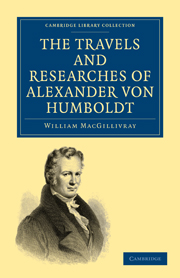 The Travels and Researches of Alexander von Humboldt
The Travels and Researches of Alexander von Humboldt Book contents
- Frontmatter
- PREFACE
- Contents
- CHAPTER I INTRODUCTION
- CHAPTER II VOYAGE FROM CORUNNA TO TENERIFFE
- CHAPTER III ISLAND OF TENERIFFE
- CHAPTER IV PASSAGE FROM TENERIFFE TO CUMANA
- CHAPTER V CUMANA
- CHAPTER VI RESIDENCE AT CUMANA
- CHAPTER VII MISSIONS OF THE CHAYMAS
- CHAPTER VIII EXCURSION CONTINUED, AND RETURN TO CUMANA
- CHAPTER IX INDIANS OF NEW ANDALUSIA
- CHAPTER X RESIDENCE AT CUMANA
- CHAPTER XI VOYAGE FROM CUMANA TO GUAYBA
- CHAPTER XII CITY OF CARACCAS AND SURROUNDING DISTRICT
- CHAPTER XIII EARTHQUAKES OF CARACCAS
- CHAPTER XIV JOURNEY FROM CARACCAS TO THE LAKE OF VALENCIA
- CHAPTER XV JOURNEY ACROSS THE LLANOS, FROM ARAGUA TO SAN FERNANDO
- CHAPTER XVI VOYAGE DOWN THE RIO APURE
- CHAPTER XVII VOYAGE UP THE ORINOCO
- CHAPTER XVIII VOYAGE UP THE ORINOCO CONTINUED
- CHAPTER XIX ROUTE FROM ESMERALDA TO ANGOSTURA
- CHAPTER XX JOURNEY ACROSS THE LLANOS TO NEW BARCELONA
- CHAPTER XXI PASSAGE TO HAVANNAH, AND RESIDENCE IN CUBA
- CHAPTER XXII VOYAGE FROM CUBA TO CARTHAGENA
- CHAPTER XXIII BRIEF ACCOUNT OF THE JOURNEY FROM CARTHAGENA TO QUITO AND MEXICO
- CHAPTER XXIV DESCRIPTION OF NEW SPAIN OR MEXICO
- CHAPTER XXV STATISTICAL ACCOUNT OF NEW SPAIN CONTINUED
- CHAPTER XXVI MINES OF NEW SPAIN
- CHAPTER XXVII PASSAGE FROM VERA CRUZ TO CUBA AND PHILADELPHIA, AND VOYAGE TO EUROPE
- CHAPTER XXVIII JOURNEY TO ASIA
CHAPTER XVIII - VOYAGE UP THE ORINOCO CONTINUED
Published online by Cambridge University Press: 29 August 2010
- Frontmatter
- PREFACE
- Contents
- CHAPTER I INTRODUCTION
- CHAPTER II VOYAGE FROM CORUNNA TO TENERIFFE
- CHAPTER III ISLAND OF TENERIFFE
- CHAPTER IV PASSAGE FROM TENERIFFE TO CUMANA
- CHAPTER V CUMANA
- CHAPTER VI RESIDENCE AT CUMANA
- CHAPTER VII MISSIONS OF THE CHAYMAS
- CHAPTER VIII EXCURSION CONTINUED, AND RETURN TO CUMANA
- CHAPTER IX INDIANS OF NEW ANDALUSIA
- CHAPTER X RESIDENCE AT CUMANA
- CHAPTER XI VOYAGE FROM CUMANA TO GUAYBA
- CHAPTER XII CITY OF CARACCAS AND SURROUNDING DISTRICT
- CHAPTER XIII EARTHQUAKES OF CARACCAS
- CHAPTER XIV JOURNEY FROM CARACCAS TO THE LAKE OF VALENCIA
- CHAPTER XV JOURNEY ACROSS THE LLANOS, FROM ARAGUA TO SAN FERNANDO
- CHAPTER XVI VOYAGE DOWN THE RIO APURE
- CHAPTER XVII VOYAGE UP THE ORINOCO
- CHAPTER XVIII VOYAGE UP THE ORINOCO CONTINUED
- CHAPTER XIX ROUTE FROM ESMERALDA TO ANGOSTURA
- CHAPTER XX JOURNEY ACROSS THE LLANOS TO NEW BARCELONA
- CHAPTER XXI PASSAGE TO HAVANNAH, AND RESIDENCE IN CUBA
- CHAPTER XXII VOYAGE FROM CUBA TO CARTHAGENA
- CHAPTER XXIII BRIEF ACCOUNT OF THE JOURNEY FROM CARTHAGENA TO QUITO AND MEXICO
- CHAPTER XXIV DESCRIPTION OF NEW SPAIN OR MEXICO
- CHAPTER XXV STATISTICAL ACCOUNT OF NEW SPAIN CONTINUED
- CHAPTER XXVI MINES OF NEW SPAIN
- CHAPTER XXVII PASSAGE FROM VERA CRUZ TO CUBA AND PHILADELPHIA, AND VOYAGE TO EUROPE
- CHAPTER XXVIII JOURNEY TO ASIA
Summary
Leaving the island of Panumana at an early hour the navigators continued to ascend the Orinoco, the scenery on which became more interesting the nearer they approached the great cataracts. The sky was in part obscured, and lightnings flashed among the dense clouds; but no thunder was heard. On the western bank of the river they perceived the fires of an encampment of Guahiboes, to intimidate whom some shots were discharged by the direction of the missionary. In the evening they arrived at the foot of the great fall, and passed the night at the mission of Atures in its neighbourhood. The flat savannah which surrounds the village seemed to Humboldt to have formerly been the bed of the Orinoco.
This station was found to be in a deplorable state, the Indians having gradually deserted it until only forty-seven remained. At its foundation in 1748 several tribes had been assembled, which subsequently dispersed, and their places were supplied by the Guahiboes, who belong to the lowest grade of uncivilized society, and a few families of Macoes. The epidemic fevers, which prevail here at the commencement of the rainy season, contributed greatly to the decay of the establishment. This distemper is ascribed to the violent heats, excessive humidity of the air, bad food, and, as the natives believe, to the noxious exhalations that rise from the bare rocks of the rapids.
- Type
- Chapter
- Information
- The Travels and Researches of Alexander von HumboldtBeing a Condensed Narrative of his Journeys in the Equinoctial Regions of America, and in Asiatic Russia; Together with Analyses of his More Important Investigations, pp. 239 - 271Publisher: Cambridge University PressPrint publication year: 2009First published in: 1832


